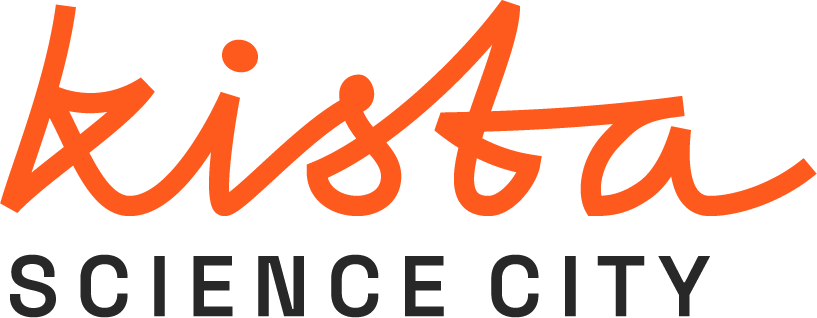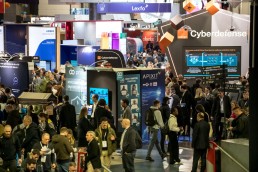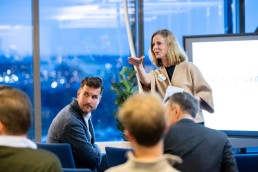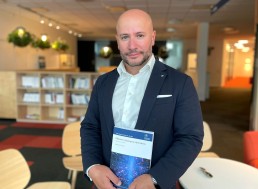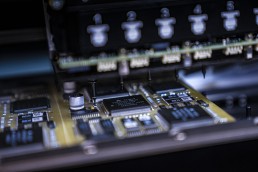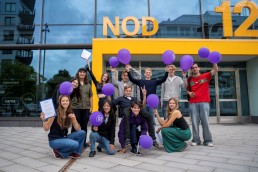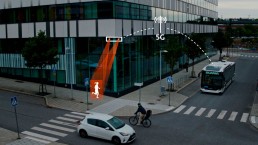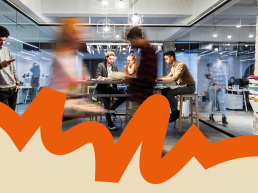Riding backwards into the future
Staff perspective:
Key takeaways from Forum International de la Cybersécurité 2025 in Lille!
Kista Science City’s Sakarias Strand attended Forum International de la Cybersécurité 2025 (InCyber Forum) in Lille as the only Swedish delegate. In this firsthand report, he highlights Europe’s leading cybersecurity strategies, emerging trends, and practical innovations—and explores how Sweden can accelerate its own cybersecurity readiness by learning from front-runners like France and Belgium.
—
4 April, 2025
As I sat backwards on the high-speed train from Lille to Charles de Gaulle, laptop balanced on my knees, the moment felt symbolic. The movement mirrored the difference I often sense when returning to Sweden’s cybersecurity conversation. While France charges ahead with integration, collaboration, and AI-driven innovation, Sweden seem stuck—awaiting clearer guidance, focused on compliance checklists and vendor comparisons.
Held in Lille, France’s rising capital of cybersecurity, InCyber Forum gathered over 20,000 attendees from 103 countries, plus another 4,000 online. It was a dense, intense, expertly curated three-day event. Attendees sat on floors, feverishly taking notes, absorbing intelligence you simply won’t find on Google. Many talks enforced strict photo bans—for good reason.
It was an honor to be the only Swedish delegate, invited by Business France as part of their France 2030 program. Being there in person—surrounded by global frontrunners and firsthand innovation—offered a rare window into how fast the field is evolving.
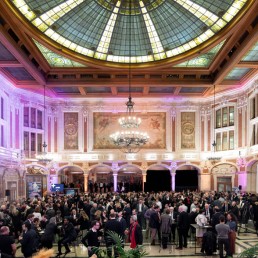
photo credit: InCyber Forum
France leads by doing: Cybersecurity as a national priority
France isn’t just theorizing cybersecurity—it’s funding, implementing, and operationalizing it. The 2021–2025 National Cyber Plan has already spawned 50 consortiums, with new cyber unicorns emerging through state-backed incubators like Cyber Booster. The result is a highly curated cyber economy where integration trumps invention, and commercialization—not just research—is the benchmark of success.
Through initiatives like the France 2030 export program and a growing network of national Cyber Campuses, France connects government, defense, academia, and industry. The goal isn’t just to study threats—it’s to actively deploy integrated, scalable solutions. In parallel, France is realigning cybersecurity education with industry needs, prioritizing hands-on skills and real-world problem-solving that prepares graduates to meet live threats from day one.
The key difference from Sweden? French actors aren’t waiting for another strategy paper—they’re already running.
A standout trend at the forum was the mature integration of AI-driven solutions—often without explicitly marketing themselves as ‘AI.’ Rather than pushing consulting or certifications, exhibitors showcased integrated technologies built on open-source intelligence. Behind the scenes, Large Language Models (LLMs) support tasks like vulnerability triage, risk modeling, OSINT, and attacker simulations.
Belgium’s NIS2 certification framework: A model for Europe
While France leads on integration and support structures, Belgium is gaining attention for its regulatory-first NIS2 approach. Since October 2024, more than 4,500 Belgian organizations have registered under a new classification system that sorts them by criticality. Each category comes with specific obligations and certification levels, giving companies a clear picture of what’s expected. This structure improves national oversight and is already viewed as a potential blueprint for harmonizing cybersecurity rules across the EU.
Instead of vague timelines or ad-hoc requirements, Belgium has mapped out a clear seven-step compliance journey—from registration and incident reporting to board-level training and third-party certification.
Supporting this is CyberFundamentals (CyFun®), a national framework from the Centre for Cybersecurity Belgium (CCB). It helps organizations navigate risk-based security levels with tools like self-assessment templates, sector-specific guidance, and optional audits. The approach lowers the threshold for smaller players while setting higher expectations for the most critical ones—creating a common playbook for SMEs, regulators, and essential service providers alike.
Meanwhile in Sweden, NIS2 transposition remains pending—expected by summer 2025 at the earliest. With the European Commission already launching infringement procedures against 23 Member States, one hopes we finalize NIS2 before NIS3 comes knocking.
Looking ahead
InCyber Forum offered a glimpse of the future—and revealed who’s already living it. The contrast with Sweden is striking. While Swedish actors often await clearer national directives before acting, countries like Belgium and France are already moving. They collaborate across sectors, fund scale-ups, and embed cybersecurity into their national growth strategies.
One thing became increasingly clear at the forum: cybersecurity is no longer about checklists or compliance alone. The threat landscape is fluid and weaponized. AI is now standard in both defense and attack. Deepfakes spread disinformation at speed. State and non-state actors blend tactics, and no company is too small to target.
Yet some of the most valuable moments didn’t happen in official sessions. They emerged on the expo floor, in hallway conversations, and online follow-ups.
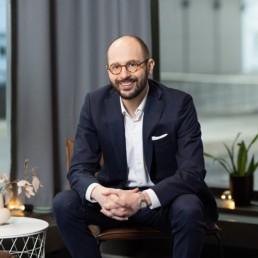
Sakarias Strand, Kista Science City, Project Manager for Sweden Secure Tech Hub
I return to Stockholm with a long list of promising contacts and collaborations—proof that insights often surfaces between the sessions.
As I’m writing this, I see Sweden’s new National Cybersecurity Strategy for 2025–2029 being released. It’s a timely document, with encouraging signals: stronger public-private collaboration, clearer responsibilities, and an ambition to align with Europe’s evolving threat landscape. If taken seriously, it can serve as a lever for real change—and a crucial boost in resilience, especially for SMEs.
Sweden has the talent and ambition to lead. But we need to move faster. The question isn’t whether we catch up—it’s whether we can afford not to. As we consider our next steps, we must ask ourselves: Are we prepared to treat cybersecurity as both an economic multiplier and security imperative? In a world of frenemies, deepfakes, and digital sabotage, neutrality isn’t an option. Compliance is a great tool—if our only threat is the government. But it’s not.
It’s time to catch up!
Text: Sakarias Strand, Kista Science City
Kista Science City selects ten scaleups for Access UK
The lineup is set! Kista Science City is backing ten cutting-edge Swedish scaleups as they take their next step toward international expansion. Through Access UK, a tailored programme to fast-track UK market entry, these companies will gain the insights, connections, and strategic support needed to scale. In June, they will head to London for three days of high-level meetings with potential customers, investors, and industry experts.
Meet the companies
The selected scaleups bring transformative solutions to a range of industries, from sustainable materials and mobility to IoT and deep tech. Each company has been chosen for its potential to thrive in the UK market and make a lasting impact in its sector.
We welcome:
- Clean Motion: Ultra-light electric vehicles designed for minimal energy consumption in urban transport.
- MyVox: MEMS technology transforming how sound and active cooling are integrated in compact electronics.
- TeraSi: Advanced semiconductor components enabling faster, more stable wireless communication.
- Flic: Wireless buttons simplifying IoT automation and smart home control.
- Proptivity: Future-proofed indoor connectivity solutions with high-performance 5G networks.
- Cemvision: Climate-neutral cement solutions revolutionizing the construction industry.
- Relox Robotics: Autonomous robots optimizing golf ball collection for efficiency and precision.
- Greeniron: Fossil-free metal recycling, reducing emissions in the steel sector.
- Brinja: IoT-driven safety solutions enhancing real-time monitoring on construction sites.
- Univrses: AI-powered computer vision for real-time urban traffic data and smart city development.
For Nicolas Bec, Chief Commercial Officer at Cemvision, Access UK presents an important opportunity to deepen market understanding and build new relationships:
“The UK is a priority market for us, and we took our first step earlier this year through a partnership with EQT Exeter. We see great potential for continued growth, driven by a strong market and new regulations that promote sustainable cement solutions like ours. Access UK will be an important opportunity to deepen our understanding of market conditions and regulations while building valuable relationships for the future,” says Bec.
Access UK: Tailored market entry
Expanding into a new market comes with challenges—from navigating regulations to building the right partnerships. Access UK is designed to support companies at different stages of their international journey: it helps those preparing for expansion take their first step into the UK, while accelerating the growth of businesses already establishing themselves in the market.
The programme consists of two phases: a preparation programme in Sweden followed by the in-market visit to London. This approach ensures participating scaleups gain both strategic insights and hands-on experience, making their market entry more effective.
Throughout the programme, they will receive:
- Exclusive meetings with key customers, partners and/or investors.
- Practical insights into navigating the UK business landscape.
- Workshops to refine communication and market positioning.
“It can take a long time for deep tech companies to enter new markets, and our mission is to shorten that process,” says Arash Sangari, Program Manager at Kista Science City. In an interview with Impact Loop, he discussed the challenges scaleups face and the need for smarter market entry strategies: “We simplify access to key contacts and help companies get what they need. Many deep tech startups struggle to even explain what they do, so there’s great value in sharpening their communication and making the right connections. Three days in this environment can save companies six months of mistakes.”
Access UK is designed for fast-scaling deep tech, hardware, and B2B businesses that have already prepared for UK expansion. Through tailored support, the programme ensures companies to maximize their market entry efforts. The selected companies range in size from 8 to 60 employees and are part of Kista Science City’s community—though not necessarily based in Kista.
Access UK is run by Kista Science City in partnership with the Swedish Chamber of Commerce for the UK and Department for Business and Trade at the British Embassy in Stockholm.
Next Stop: Germany
While Access UK kicks off in June, another opportunity is now open for Swedish scaleups looking to expand into one of Europe’s largest economies. Access Germany—scheduled for October 2025—offers a similar tailored programme, providing selected deep tech and hardware companies from the Stockholm region with market insights, key industry connections, and strategic support to establish a foothold in Germany.
Companies interested in Access Germany can apply now!
The Access UK and Access Germany programmes are funded by the Region of Stockholm and the European Union.
Building resilience: Cybersecurity innovation in Kista
Cybersecurity is a key part of the modern digital landscape. As technology evolves, so do cyber threats—making security a top priority for businesses, governments, and researchers alike. With threats becoming more sophisticated, the need for robust security measures is greater than ever.
In Kista, these challenges are being met with action. Home to a dense concentration of cybersecurity experts, research institutions, and pioneering tech companies, the area plays a fundamental role in advancing Sweden’s digital security. Here, local organizations collaborate to develop, test, and implement cutting-edge security solutions that help protect businesses and society from emerging threats.
These efforts take different forms—from testing environments that simulate cyber threats to national initiatives helping businesses build stronger digital defenses. Below, we take a closer look at some of the key projects driving cybersecurity innovation in Kista.
H2 – Cyber Range: Test bed for cybersecurity
Cyber Range is a RISE-led test bed where companies and organizations can build fully controlled virtual environments to assess, test, and secure IT systems. It provides tools for testing new system components, ensuring correct implementation, and identifying vulnerabilities before they can be exploited.
Beyond technical testing, Cyber Range also provides a controlled setting where organizations can evaluate security routines and response strategies under realistic conditions. As digital threats evolve, test environments like this help organizations stay ahead of cyber risks.
Sweden’s Civil Minister Erik Slottner recently visited Kista and Cyber Range to get a firsthand look at these efforts. During his visit, he emphasized the growing need for proactive defenses to protect both public and private sectors. He also highlighted that Sweden’s cybersecurity progress depends on collaboration—bringing together industry, research institutions, and policymakers to strengthen national resilience.
H2 – Sweden Secure Tech Hub: Making cybersecurity accessible
For many small and medium-sized enterprises (SMEs), cybersecurity can feel overwhelming—full of technical complexity, regulatory challenges, and financial barriers. Unlike larger companies with dedicated security teams, these businesses often lack the resources to build strong digital defences. Yet they are just as vulnerable to attacks.
Sweden Secure Tech Hub helps bridge this security gap. Led by Kista Science City and five other science parks, this national initiative provides targeted support, equipping businesses with the knowledge and tools needed to strengthen their cybersecurity. Through its programs, Sweden Secure Tech Hub provides:
- Need analysis – A structured evaluation that helps businesses identify security gaps and areas for improvement.
- Expert advice – Professional guidance tailored to an SME’s specific security challenges and industry requirements.
- Testing – Controlled cybersecurity assessments that detect vulnerabilities before they become serious threats.
- Networking – Opportunities to collaborate with cybersecurity specialists, technology providers, and other businesses navigating similar security challenges.
By making cybersecurity expertise more accessible and actionable, Sweden Secure Tech Hub ensures that digital security isn’t just for large corporations—it’s within reach for every business that needs to protect itself and its customers.
H2 – Basic Cybersecurity: A hands-on course for SMEs
To help SMEs translate cybersecurity knowledge into action, Kista Science City is co-organizing a free, instructor-led training program designed specifically for small and medium-sized businesses. Developed by Linköping University and Linköping Science Park, the course provides guidance on preventing and responding to cyber threats.
Basic Cybersecurity equips businesses with practical skills to integrate security into their daily operations. Over four workshops, participants will learn how to:
- Identify cybersecurity risks that could threaten their business.
- Apply key security principles to prevent attacks before they happen.
- Develop a security-first mindset across their organization.
- Respond effectively to incidents to minimize damage and recovery time.
The course is held on-site in Kista, offering an interactive learning environment with real-world applications. Fully funded through Sweden Secure Tech Hub, it is free of charge, with applications open until 11 March, 2025.
Limited spots available—Read more and apply today!
For questions, contact Sakarias Strand, Kista Science City: sakarias.strand@kista.com
Innovation and Defence: NATO Innovation Fund in Kista
How can innovation help build resilience in an unpredictable world? For the NATO Innovation Fund (NIF), the answer lies in cross-sectoral collaboration—connecting the brightest minds in tech with defence stakeholders to tackle evolving security challenges. This mission brought NIF to Kista Science City where some of the country’s leading deep-tech companies took center stage.
NIF: Investing in resilience
The NATO Innovation Fund is the world’s first multi-sovereign venture capital fund, backed by 24 member nations and equipped with €1 billion to deploy over 15 years. Its mission: to support early-stage European tech companies developing solutions that strengthen resilience and security across the Alliance.
Sweden, NATO’s newest member state and home to one of Europe’s most established venture ecosystems, was a natural choice for this engagement. “Sweden has had great success in innovation and scaling companies globally,” said Patrick Schneider-Sikorsky of NATO Innovation Fund. “The frameworks here make it an exceptional place to do business. We look to invest in early-stage, breakthrough solutions, and Sweden offers outstanding potential for innovation.”
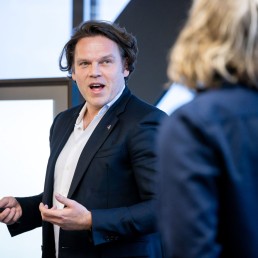
Patrick Schneider-Sakorzky, Partner at Nato Innovation Fund
Pioneering tech on display
Kista was one of only two stops on NIF’s Sweden tour, chosen for its strong ecosystem of deep-tech companies. The visit was part of their broader strategy to identify and invest in dual-use technologies—solutions with applications in both civilian and defence settings. These technologies are key to addressing modern security challenges, from safeguarding critical infrastructure to enhancing resilience against cyber threats.
During the event, 10 Stockholm-based companies presented their solutions. These included technologies in autonomous systems, energy solutions, advanced materials, and next-gen communication technologies. Here’s how three of these companies are driving innovation that could support security and resilience efforts:
Ovzon: Resilient satellite communications
Ovzon presented its advanced satellite system, designed to ensure secure communication in contested environments and enabling multi-domain operations. With features like GPS-denial resilience, ultra-mobile terminals and full sovereign control, Ovzon’s technology supports NATO Innovation Fund’s mission to enhance resilience and build next-generation communication systems. “Secure, reliable communication is critical for defence operations, and our technology addresses those needs, already today in the most demanding environments,” said Per Wahlberg, Deputy CEO of Ovzon.
Papershell: Next-gen lightweight materials
Papershell introduced its biogenic material that is lighter than aluminum, stronger than plastic, and 100% fossil-free. With automated, flexible production in Sweden, it can rapidly scale for applications across industries, ranging from automotive to drone manufacturing. The company’s innovation aligns with NATO Innovation Fund’s focus
on resource sustainment for defence and civil needs. “By using locally sourced input materials, we create a 100% biogenic, fossil carbon-free alternative—proving that sustainability and resilience go hand in hand,” said Anders Breitholtz, CEO of Papershell.
As the company scales production, its goal is to provide one of the market’s cheapest load-bearing materials, making it a cost-effective alternative to traditional composites. This would help member nations reduce reliance on foreign-subsidized materials while significantly cutting emissions.
TeraSi: Compact and secure connectivity solutions
TeraSi showcased its RF modules, capable of securely transferring large volumes of data, even on moving platforms like drones. The compact design and efficiency of this technology directly support NATO Innovation Fund’s goal of advancing secure, deployable communication systems for defence operations. “Connectivity is vital for protecting critical assets, and our solutions make it possible to securely transfer data across domains,” said James Campion, CEO of TeraSi.
With ambitions to enable seamless data transfer across air, space, and terrestrial networks, TeraSi is paving the way for fiber-like connectivity in dynamic environments. Read Dagens Industri’s interview with CEO James Campion to learn more about the company’s advancements (subscription required).
Key takeaways from the event
NATO Innovation Fund’s visit to Kista Science City underscored an important shift: private sector innovation is now a driving force in modern security and defence. As security threats evolve, so must the solutions, and effective collaboration between innovators and defence stakeholders is essential to staying ahead. Here’s what we know:
- Sweden’s NATO membership is unlocking opportunities for its tech industry. Since joining the Alliance in March 2024, Swedish tech companies have new pathways to contribute on a global scale—not only in security and defence but also in strengthening international partnerships and knowledge-sharing across borders.
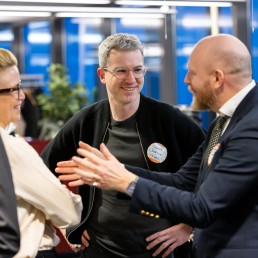
- Bridging private-sector innovation with defence needs is essential. As security challenges evolve, so does the need for cutting-edge solutions—many of which now emerge from the private sector. Stronger collaboration between startups, investors, and defence stakeholders ensures that these innovations are developed, scaled, and deployed where they can have the greatest impact.
- Adaptable technology is key to building resilience in an unpredictable world. Modern security threats are increasingly complex, spanning cyber risks, physical vulnerabilities, and shifting global tensions. To stay ahead, defence and security systems must integrate flexible, dual-use technologies that can evolve alongside emerging challenges.
Our commitment
Sweden’s innovation ecosystem is becoming increasingly connected to the international defence landscape, and Kista Science City is part of that process. We work closely with tech innovators, investors, and global defence stakeholders—helping companies navigate regulatory landscapes, secure funding, and build strategic partnerships that drive meaningful impact.
Do you want to get involved? Reach out to sakarias.strand@kista.com to explore opportunities for collaboration!
Future-proofing Sweden’s cyber defenses
Future-proofing Sweden’s cyber defenses
As Sweden’s digital infrastructure grows, so do the risks to many critical services. From hospitals and banks to energy grids and transportation systems, cyber threats targeting essential systems are on the rise, posing significant dangers to national security. Yet, despite these risks, some experts argue that Sweden’s current cybersecurity policies are insufficient, leaving many organizations vulnerable.
In a recent article, Kista-based cybersecurity researcher Gazmend Huskaj underscores that many Swedish organizations, large and small, are underprepared for digital threats. Without solid security strategies and frameworks in place, these organizations could face major disruptions from cyberattacks, putting critical services at risk. And these risks are not just theoretical—recent incidents in other countries have shown how devastating such attacks can be.
What steps can Sweden take?
Huskaj points to the importance of a coordinated national response. Strengthening Sweden’s cybersecurity will require more than government action alone. It will involve collaboration between the public and private sectors, as well as academia, to create open channels for sharing knowledge and responding swiftly to emerging threats. Key areas to address include:
- Cross-sector collaboration: Open communication between industries, government, and academia is critical to building a robust defense.
- A clear national strategy: Defining Sweden’s approach to both defensive and offensive cybersecurity measures is crucial for long-term security.
- Preparedness at all levels: Ensuring that all organizations, large or small, have strong cybersecurity measures is vital for safeguarding critical infrastructure.
In today’s digital world, a combined cybersecurity effort is essential for protecting Sweden’s future. Kista is becoming a national powerhouse for cybersecurity, where a growing node of companies, actors, and initiatives wants to raise the cybersecurity awareness of Swedish businesses and public sector. RISE Cybersecurity center is leading the way, but also supported by the strong research at the Department of Department of Computer and Systems Sciences at Stockholm University, FOI, and several businesses with competence in the field.
Do you want to get involved in Kista Science City’s cybersecurity initiatives? Reach out tosakarias.strand@kista.com today!
Mycronic expands to Kista, strengthening the local semiconductor ecosystem
Mycronic expands to Kista, strengthening the local semiconductor ecosystem
Mycronic, a global leader in manufacturing equipment for the electronics and semiconductor industries, is relocating its High Flex division to Kista. This division specializes in advanced solutions for flexible production and electronics manufacturing.
With its technology emerging from RnD at KTH (Royal institute of Technology) Mycronic’s arrival will further boost the local semiconductor ecosystem. The move fosters collaboration and innovation. It also brings great value in terms of Mycronics strong focus on sustainability and diversity, all together creating new possibilities for cutting-edge developments in electronics manufacturing.
Their new space in Kista will house offices, production facilities, and storage, supporting Mycronic’s continued growth and technological advancements.
Welcome to Kista, Mycronic!
Next-gen innovators solve real-world needs in Kista
Next-gen innovators solve real-world needs in Kista
This summer, 125 young people from across Stockholm had the opportunity to participate in a program developing their entreprenurial skills. With key activities taking place in Kista, the program gave participants the opportunity to engage with real-world societal issues presented by the City of Stockholm. This initiative is part of a broader effort to engage with youth and connect them with students, businesses, local authorities, and academic institutions in Kista.
Community engagement
The program, run by Rookie Startups, engaged people aged 15-19, giving them the opportunity to go beyond theoretical ideas and work hands-on with challenges directly impacting the city. Collaborating with departments in areas like environmental protection, culture, and urban development, they were tasked with solving practical issues affecting the community.
This partnership enriched the projects with fresh perspectives while offering the youth hands-on experience in addressing public sector challenges. “The collaboration not only helped the participants develop their own skills but also provided these departments with valuable insights from a younger perspective,” notes Emma Roxtröm, project leader at Rookie Startups.
Throughout the program, Rookie Startups provided essential support in terms of resources, guidance, and aligning the program with broader educational goals. This support has been crucial in ensuring the program’s success, helping to prepare the participants for future careers while aligning with the city’s vision of creating a vibrant, innovative community.
The impact of the program
Throughout the program, participants made significant strides, with 97% reporting increased knowledge in social entrepreneurship and concept development, and 91% noting personal growth. “We’re incredibly proud to see how much these young people have developed, both professionally and personally. They’ve gained invaluable experience in entrepreneurship and have developed the confidence to voice their ideas and participate actively in their communities,” says My Ekstrand, CEO of Rookie Startups.
Beyond individual development, the program plays a key role in strengthening community bonds across Stockholm. The 125 participants were employed by all 11 district administrations across the city, with many of them visiting Kista for the first time. “We’re excited to welcome more young people to Kista and introduce them to the wide range of opportunities here, from education to career paths in the tech industry,” says Mikaela Färnqvist of Kista Science City.
Want to help shape the future of Kista? Reach out to learn how your organization can get involved: mikaela.farnqvist@kista.com
Is your business ready to scale globally?
Is your business ready to scale globally?
Sweden offers strong support for early-stage companies focused on commercialising research and technological advancements. However, as businesses grow and prepare to scale into international markets, the range of available support narrows.
Richard Savage, Business Development Specialist at Stream Analyze – a company leveraging edge AI to optimise the management of large automotive fleets – was one of the first companies to join the Scale Hub modules focusing on sales and branding.
“The Scale Hub programme came at exactly the right time for us; it allowed us to stand back and re-evaluate our messaging, our pitch, and our values at the perfect moment in our growth phase. The ScaleHub opportunity appeared just in time for us to run through such important exercises with the right people. I can recommend it highly to anyone lucky enough to receive an invitation to participate.”
To ensure maximum value for participating companies, the programme is modular-based and tailored to meet current, specific needs. Each module is led by carefully selected industry leaders such as Salesonomics, EY Doberman, San Francisco Agency, Potter Clarkson, Synch, TalentX, and others, and consists of half-day workshops that include assignments and follow-up sessions. Furthermore, Scale Hub offers Market Access programmes for the American, British, and German markets that are built on the in-depth modules.
Tatjana Choudhary and Arash Sangari, who are leading the Scale Hub programme, strongly encourage companies to involve both management and team members in the workshops to maximise the benefits. They estimate that participating companies will spend around 25 hours on Scale Hub modules and 20 hours on a Market Access programme.
On 16th October, the British-Swedish Chamber of Commerce, in partnership with Kista Science City and the British Embassy in Sweden, will host AccessUK – a kick-off event for Swedish transformative companies interested in exploring the UK market. Learn more about the event here.
The application window for Scale Hub is open until 9th October, with the first modules starting on 17th October. Arash Sangari emphasises that the programme aims to support transformative companies with global ambitions. Applicants should either have a minimum of 10 employees, have achieved 20% annual growth for three consecutive years, or have successfully raised seed capital.
16 Oct: Intro to Access UK – Evening session on the UK market and what to expect in the on-site program happening in May 2025.
17 Oct: Growth Strategy Workshop with Salesonomics – Build a winning sales plan.
22 Oct: Building Business through Brand & Design with EY Doberman – Leverage brand identity as a growth tool.
6 Nov: Sales Roadmap & Positioning with Salesonomics – Develop a sales strategy to stand out in the market.
- 14 Nov: Strategic PR Workshop with San Francisco Agency – Maximize market presence through strategic communications and matchmaking with tech media.
Until 9th of October companies are able to apply for the Scale Hub programme this autumn, with the first modules starting on 17th of October. Arash Sangari emphasizes that the program aims to support transformative companies with global ambitions. Applicants should either have a minimum of 10 employees, have achieved 20% annual growth for three consecutive years, or have successfully raised seed capital.
Read more about Scale Hub!
5G Ride: paving the way for a better public transport
Four years ago, representatives from the telecoms industry, academia and the public sector teamed up to test a 5G-connected autonomous vehicle for public transport. Today, the project has expanded with new partners and resulted in technical solutions that make autonomous vehicles better in terms of safety and security while efficiently integrated in the transport system.
Back in 2020, Kista Science City, Ericsson, Telia, Keolis and Intel, with financing from Vinnova and Drive Sweden, launched the 5G-connected and autonomous electric minibus 5G Ride on the island of Royal Djurgården in the Swedish capital, Stockholm. Prince Daniel of the Swedish Royal Family was among the dignitaries that attended the official inauguration ceremony. Since then, Scania, KTH, Region Stockholm, T-Engineering, Viscando, Vy and Applied Autonomy have joined the project, putting focus into technical solutions that make autonomous vehicles safe in traffic, secure for passengers and efficiently integrated in the overall transport system.
Subsequent achievements include further developing the Traffic Tower concept from Applied Autonomy using a 5G connection to monitor and manage fleets of self-driving vehicles on public roads, as well as deploying sensors in infrastructure that enhance the traffic perception of self-driving vehicles by sharing real-time traffic data via a low latency reliable 5G network.
Throughout the project, the goal has been to ensure safety and stability for solutions to be implemented in regular traffic, and to make 5G-enabled electric driverless public transport services a reality. Ericsson has contributed with a private 5G network to evaluate how new features in 5G can support the use cases in question. Telia provided connectivity through its public 5G network and a private 5G network at Scania’s test track in Södertälje in collaboration with Ericsson. Intel delivered analytics and processing for onboard AI, while both Scania and Applied Autonomy delivered vehicle and self-driving technology. Viscando provided smart 3D&AI based infrastructure sensors, and KTH conducted research on both 5G network capacity and advanced sensor fusion and driving logics. In addition, Vy Buss has investigated how customers experience safety on board when the bus is driven without a safety driver. Through focus groups, Vy has also investigated how communication between the control tower and the bus worked in an emergency.
On September 26, the Future 5G Ride project will showcase key enablers for autonomous transport in Kista Innovation Park, focusing on safe and inclusive journeys. Visitors can experience a ride in the driverless vehicle and learn about crucial aspects such as robustness, passenger interaction and the ability of 5G to serve various strict application requirements on demand – known as differentiated connectivity.
Lucas Uhlén, Project Manager at Kista Science City, says: “The 5G Ride project unites a diverse consortium of partners, working together to challenge and innovate within autonomous driving and sustainable public transport. Kista Science City continues to play a supportive role in expanding these partnerships, bringing in new collaborators, and ensuring that the technical development of each partner is aligned with the overall goals of the project. By bringing together different perspectives and expertise, we are accelerating innovation and creating scalable solutions for the future of public transport.”
Magnus Leonhardt, Head of Strategy & Innovation, Telia B2B, says: “The 5G Ride project has given us unique insights around the demands on connectivity, and 5G specifically, to enable self-driving vehicles to be deployed safely in public transport. We have also had the opportunity to use our joint capabilities in our 5G-innovation program NorthStar, that we run with Ericsson and that Scania is also part of, to trial key scenarios in the 5G Ride-project. We look forward to continuing this work with customers and partners in public transport and the automotive industry, to allow for the transition to safer, more efficient, and sustainable solutions for public transport.”
Håkan Olofsson, Head of Systems Concepts & Algorithms, Ericsson, says: “5G Ride is a good example of a use case with strict 5G requirements. The project shows that when these strict 5G requirements arise during a journey, 5G capabilities are provided instantly via network APIs, that allow application developers to easily access 5G capabilities such as differentiated connectivity. Ericsson’s network support for differentiated connectivity ensures a reliable network performance, even at times of peak network load.”
Olav Madland, CEO of Applied Autonomy AB, is enthusiastic about scaling these autonomous transport services in Sweden and Europe. He says: “Based on the outcomes of this project, mobility operators can offer passengers a seamless and comfortable experience in driverless vehicles. Our Control Tower, xFlow, leverages integrations with Ericsson and Intel to provide a comprehensive solution for operators.”
Request for Interest cyber test and validation
